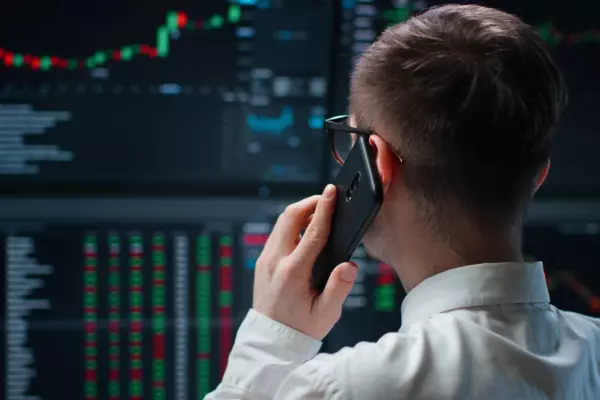Investor focus switches as disruptive technology drives growth
Investors ought to be looking to the long term as innovation, particularly in the healthcare, technology and renewable energy sectors, is expected to be a key driver in financial markets this year, a leading investment expert believes.
Andrew Bascand, Managing Director of investment management company, Harbour Asset Management, says for the past few years financial markets have been impacted by low interest rates and inflation. But with the transition from a near-zero interest rate world well established, he believes investors may well be advised to pay more attention to what might drive economic growth in the years to come.
“It is my view is that companies that re-invest capital to implement ideas stemming from a strong research and development programme are more likely to deliver this growth and succeed as we move into 2024 and beyond.
“These companies are often called compounders (those re-investing in services, products, people and innovation) and I believe we will see a big dispersion in returns between those investing in these ways and those that don’t.”
Bascand says while compounders are often found in the healthcare and technology sectors nearly every industry has their compounders, those who take market share through business practices that focus on client outcomes, especially longer-term client outcomes.
 Andrew Bascand, Managing Director of Harbour Asset Management
Andrew Bascand, Managing Director of Harbour Asset Management Investors have already jumped on innovation themes in the past year, and this will continue to drive both economic growth and the markets.
“The opportunity of AI (artificial intelligence) and the disruption of weight loss drugs (GLP-1) have already been widely canvassed and considered by markets,” he says. “Early AI adopters known as the Magnificent Seven (a group of US stocks including Microsoft, Amazon, Meta, Apple, Nvidia, Tesla and Google parent Alphabet)) saw their market value rise by a combined $6 trillion in 2023, an outcome few expected.
“AI adoption will continue, and thousands of companies will become beneficiaries, not just the Magnificent Seven.”
However, he believes other innovations and disruptive technologies may be increasingly factored into expectations of future revenue, employment and profitability opportunities. For example, the market will ‘vote’ on the potential success of Microsoft’s AI driven chatbot, Copilot, and those of other technology providers.
“So far Copilot has only been available to large enterprises, but I’m sure within a few months you and I will be able to buy it, probably for a reasonable price,” Bascand says.
“It also seems likely the market will see more takeovers in the broader technology sector in the scramble to gain intellectual capital around AI. The takeover offer for Wellington-based Volpara Health Technologies by South Korean company Lunit is one example.”
Volpara uses AI to provide imaging analytics to assist in the early detection of breast cancer. Lunit also provides AI-powered solutions for cancer diagnostics and therapeutics and Bascand says their move seems largely about bringing together the AI capabilities of both firms.
Globally the takeover, merger and acquisition doors are wide open in the technology sector and the markets need to be awake to this.
In other spheres of healthcare, he says innovation in precision medicine is a growth area while the global focus on radiopharmaceuticals in the detection and therapeutic treatment of various cancers and illnesses continues to accelerate.
Gene-editing technology known as CRISPR is already widely used for scientific research, although very much a niche innovation.
“While the public is wary and others are aghast at the concept of CRISPR, in 2023 the US Food and Drug Administration (FDA) approved the first use case,” he says. “Now that the door has been opened, other potential CRISPR and gene therapy treatments are likely to attract a diverse range of reactions from both regulators and investors.”
Bascand says renewable energy remains a significant investment focus globally with trillions of dollars forecast to be spent in the next few years on energy transition. These forecasts exclude the ongoing uptake of electric vehicles and driving automation.
“Despite this, there has been a huge increase in the number of e-vehicles in Europe, the US and China and, in 2024, it is predicted a record 9.5 million will be produced globally.
“While the war in Ukraine has impacted the renewable energy sector it has, at the same time, enhanced the desire in Europe to be energy self-sufficient and resulted in increasing investments in solutions like solar and wind power.
However, Bascand says some pressure points face investors which will require hard decisions and long-term thinking: “Regional conflicts like those in the Ukraine and Middle East are core headline influencers; in 2024 two billion people will vote (including elections in the US and India) which may create uncertainty for investors while many structural imbalances in the world and local economy are unresolved.
“These risks are heightened in a high interest rate world and countries that run prolonged fiscal deficits like New Zealand and the US, or who have high current account balances not matched by strong economic returns, may find funding those imbalances acting as harder constraints in 2024.
“The same could be said for global and local companies weighed with either too much debt or insufficient cash for future growth funding. In New Zealand that same debate is already being exposed at both a government and local council level with decisions to cancel or amend investment decisions and potentially ‘rearrange’ balance sheets.”
But Bascand believes the future is looking positive. “I think a higher cost of capital and globally a reduced supply of labour will both place higher interest in innovations and in disruption that makes a lasting positive influence.
“Investing in first-stage entrepreneurs and founders, and companies more generally in maintaining a focus on disruption lays the groundwork for future growth, employment and profitability.”
For more information go to: harbourasset.co.nz
This article does not constitute advice. The Product Disclosure Statements for Harbour Investment Funds, offered by Harbour Asset Management, are available at harbourasset.co.nz Harbour Asset Management is the investment manager for portfolios that invest into companies mentioned in the article.






